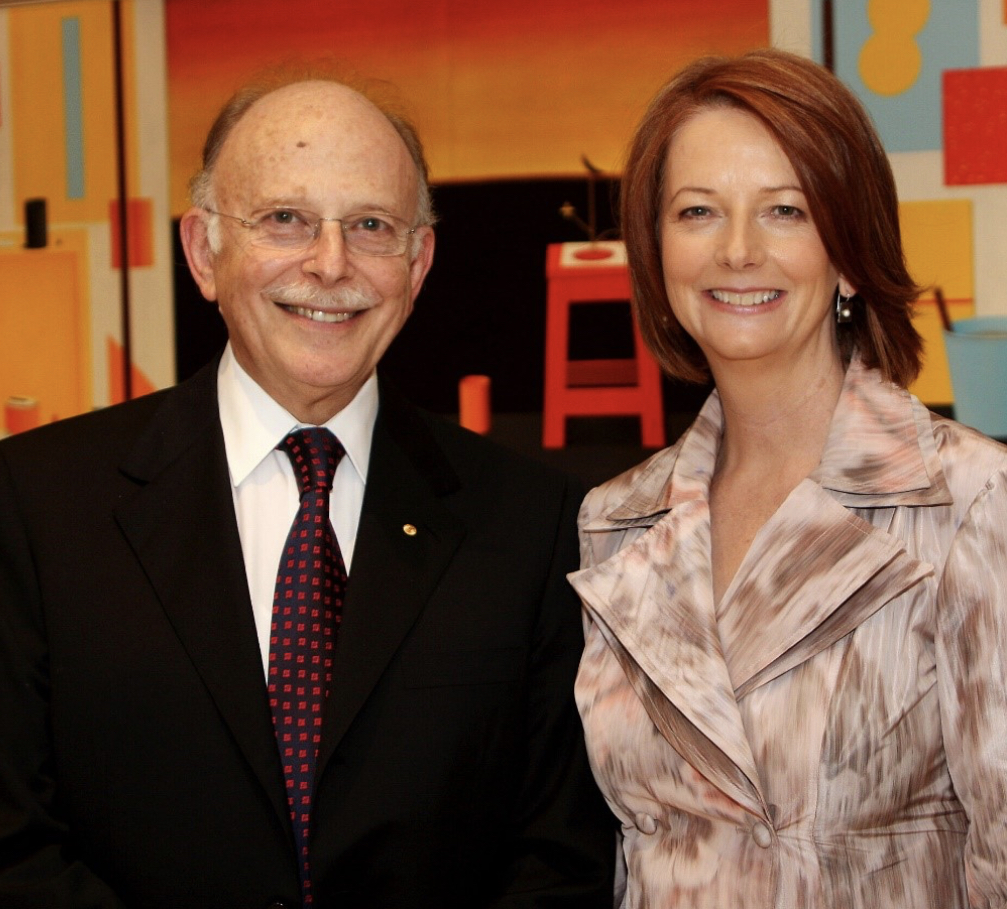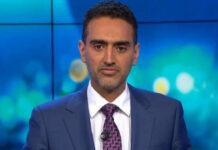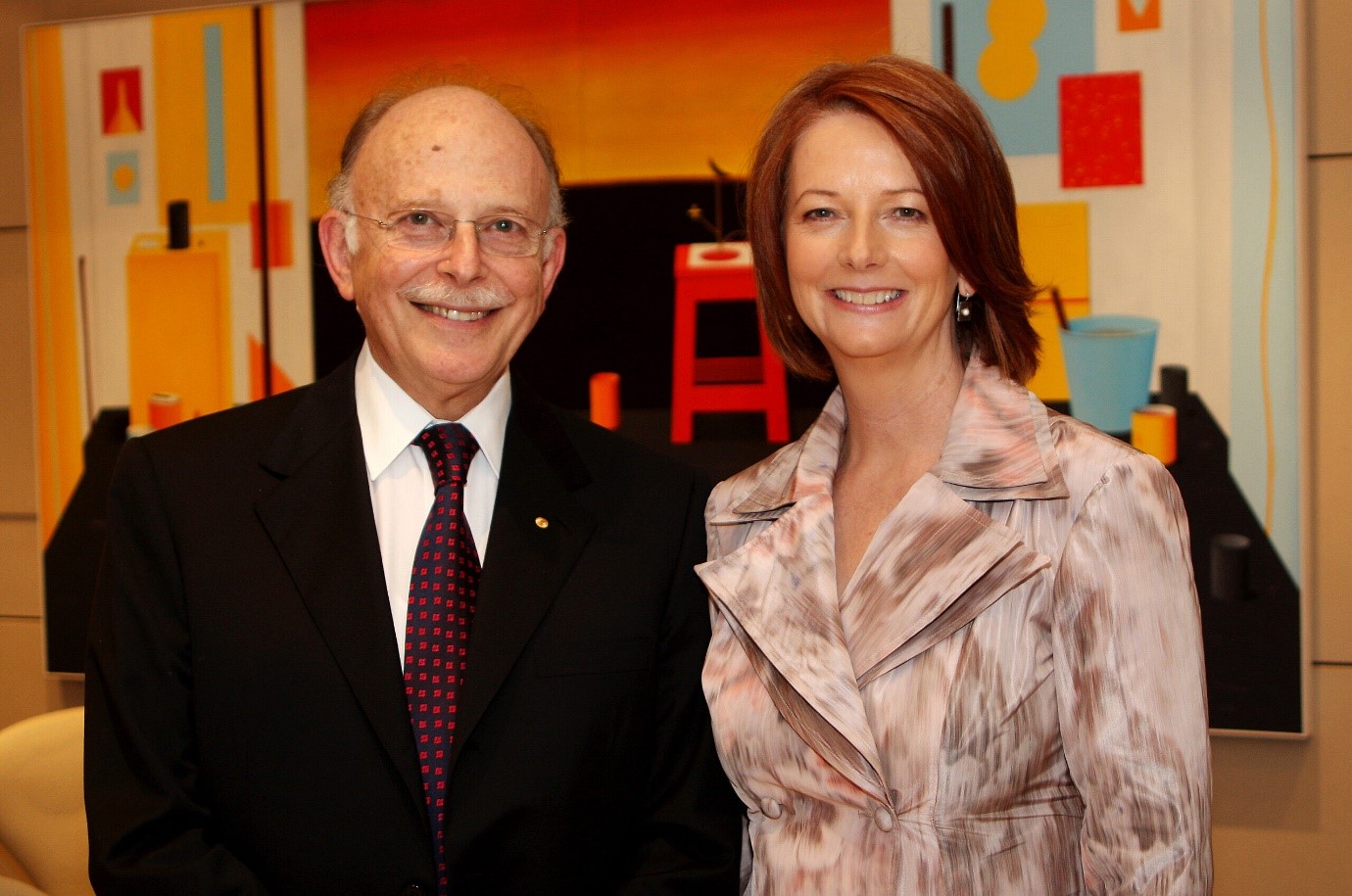
Editor’s Note: This week will feature a series of articles written by Brenton Sanderson, courtesy of The Occidental Observer. They focus on the role of jewish ethnic lobby groups and in particular Mark Leibler in pushing “diversity” and mass immigration on an Australia that never asked for it.
Furthermore, while XYZ News has focused on the role of Marxists, political aborigines and international institutions in foisting “the voice” referendum upon us, it is important to understand the motives of jewish ethnic lobbyists who are fellow architects of the so-called “voice to parliament”.
Go to Part 1.
Go to Part 2.
Go to Part 3.
Australian Foreign Policy: Hijacked by AIJAC
The Australia Israel & Jewish Affairs Council (AIJAC), chaired by Leibler, is undoubtedly the most aggressive Jewish lobbying organization in Australia. Gawenda describes it as “the most formidable lobbying outfit for Israel and for what AIJAC perceives to be Jewish community interests in Australia.”[1] AIJAC emerged out of Australia/Israel Publications (AIP) which published Zionist literature and organized venues for Israeli politicians and commentators to speak in Australia. By the early 1990s, the Jewish academic and activist Colin Rubinstein (later Prime Minister John Howard’s Court Jew), who had been involved with AIP since 1977, was “telling people, Leibler included, that AIP was not viable and needed to be professionalized along the lines of the American Israel Public Affairs Committee (AIPAC), one of the most powerful lobbying bodies in Washington.”
An indefatigable networker, Rubinstein went to see a number of wealthy Jews in Melbourne and Sydney who “quickly agreed to support his vision of a professionally run and well-resourced replacement for the AIP.”[2] Among the wealthy Jews who responded enthusiastically to Rubinstein’s appeal was the retail mogul Solomon Lew, who had once been Rubinstein’s schoolmate. Lew contributed significant funding and persuaded some of his fellow Jewish billionaires to help bankroll AIJAC. Mark Leibler joined the organization as chairman at the urging of Solomon Lew — who was a client of ABL. Asked who AIJAC is supposed to represent, Lew replied “It represents Australian Jewry and it represents Israel. We are recognized by more politicians in Australia from all sides. They never make a speech without checking with us.”[3]
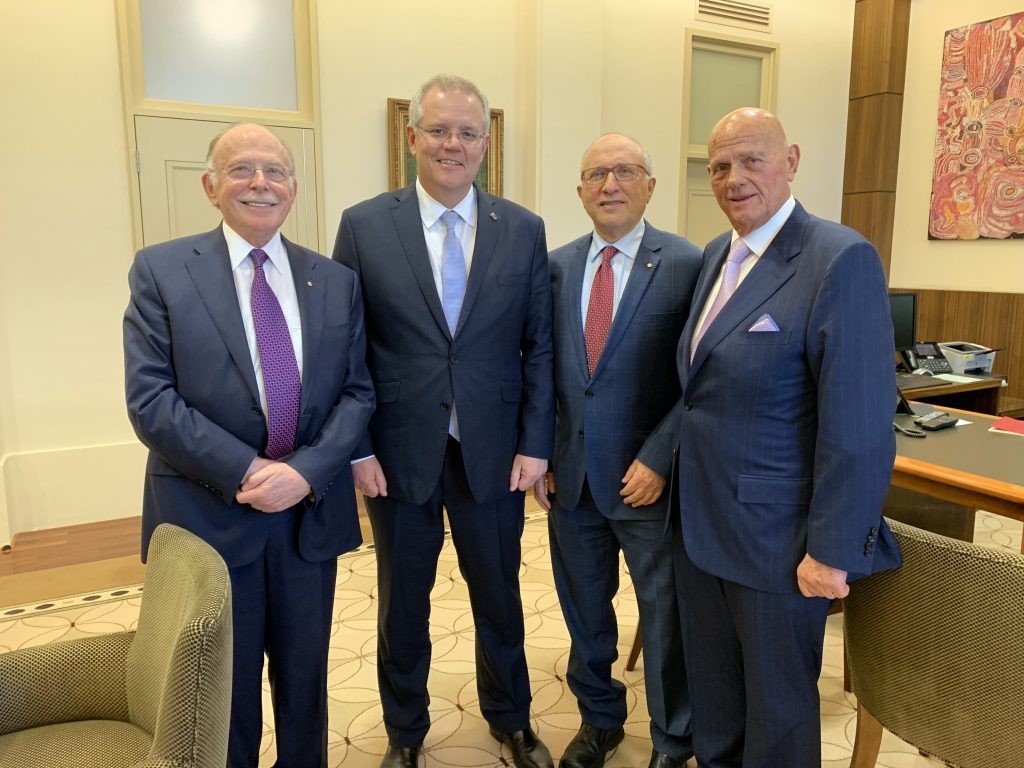
With an impressive suite of offices in Melbourne, and with a staff of 17, eight of them full-time policy analysts and journalists, Gawenda notes that “No Jewish representative body in Australia has such resources, contacts and clout.” AIJAC’s Sydney office is run by Jewish activist Jeremy Jones whose current focus is on “developing relationships with Australia’s Muslim community, a process still very much in its infancy.”[4] Leibler and Colin Rubinstein, a Monash University lecturer in Middle East Studies (and rabid Zionist) built the body into “one of Australia’s most formidable lobbying outfits.” When there’s lobbying to do in Canberra, Leibler is invariably part of the AIJAC delegation.
Leibler has visited Israel continuously for 25 years, and has close relationships with Israeli politicians, including prime ministers, and senior Israeli public servants, among them Yuval Rotem, head of the Israeli Foreign Ministry and close advisor to Prime Minister Netanyahu. While AIJAC officially claims to support a two-state solution to the conflict between the Israelis and Palestinians, it “has consistently argued that the peace process is stalled indefinitely” for which it blames the Palestinian leadership.[5] In reality, AIJAC has “publicly disowned any prospect of a two-state solution to the conflict between Israel and the Palestinians.”[6] While vehemently rejecting the feasibility of Israel as an ethnically-diverse, multicultural state, AIJAC is, however, deeply committed to multiculturalism in Australia, and relentlessly “lobbies on issues that affect Australian Jews, such as anti-Semitism and the health of multiculturalism.” Rubinstein insists that “multiculturalism has served the Jewish community well” and responds vociferously to any critiques of a policy that is deliberately designed to harm the group genetic interests of the White Australian majority.[7]
AIJAC is also committed to silencing those who don’t share its views, including fellow Jews, and “their criticism of people who held views they didn’t like was almost always extreme and sometimes personal.”[8] Gawenda personally attests to the accuracy of such claims, and notes that during his tenure as editor of The Age in the 1990s:
I would receive, at times almost daily, AIJACs criticism of the work of its Middle East correspondent, either by email, phone or in meetings at newspaper offices. The AIJAC spokespeople were smart, relentless, knew their stuff, and were blunt, sometimes to the point of rudeness, in their criticism of the paper and some of its journalists and commentators. I also received emails and phone calls, some of them abusive and hostile, from people whose views on Israel were to the far right of AIJAC, about some aspect of our coverage of the Middle East. Invariably, I was accused of being an anti-Semite or a self-hating Jew.[9]
The effectiveness of Leibler and Rubinstein’s activism can be gauged by the fact that “over 70 per cent of Australian Jews in all age groups, no matter their religious affiliations — even secular Jews — describe themselves as Zionists.”[10] More than 90 per cent of Australian Jews over the age of 18 have visited Israel (often through programs like Birthright), many more than once. Two in three have close family living there. These figures are higher than in any other diaspora Jewish community. Around 10,000 Australian Jews have made Aliyah (while retaining their Australian citizenship), proportionately more than any other Western country.[11] Australia’s Zionist youth movements “are thriving and membership is growing,” an achievement that is “unparalleled anywhere in the world.”
Capturing Elite Opinion through Rambam Fellowships
AIJAC funds and coordinates trips to Israel for journalists, editors, academics, public servants and politicians. These trips are part of the organization’s Rambam Israel Fellowship program which is named after the twelfth-century Jewish philosopher Moses Maimonides — Rambam being an acronym of his full name and title. Participants travel to Israel to be propagandized by senior Israeli politicians, journalists, commentators and military and security officials. Gawenda notes how:
AIJAC has funded Rambam fellowships for scores of Australian politicians, including [current Prime Minister] Scott Morrison and [former Opposition Leader] Bill Shorten when they were backbenchers, and [former Prime Minister] Julia Gillard when she was Shadow Minister for Health. About 500 journalists, commentators, senior public servants and academics have also participated in the program, which is funded by donations, mostly from some of Australia’s wealthiest Jewish families.[12]
The journalists involved in this “cultural exchange” program (including prominent News Limited journalists Greg Sheridan, Andrew Bolt, Rita Panahi, and Janet Albrechtsen) are lavished with hospitality in Israel and intensively propagandized by the Zionist establishment there. The goal is to foster a sense of obligation and loyalty to Israel which is, in turn, reflected in these journalists’ strict adherence to a pro-Jewish and pro-Zionist line. The only real “exchange” involved with this program is journalists trading their intellectual and journalistic integrity for the strategically-bestowed hospitality of organized Jewry. Lawyer and journalist Greg Barns noted the obvious parallels between the old Soviet Union and the Israel Lobby in their courting of Western journalists:
Back in the days when the hammer and sickle flew proudly, the Soviet Union would spend big dollars on paying for journalists, academics and diplomats to see for themselves the “workers’ paradise.” It was part of a long term and relentless strategy by the Communists to win the propaganda war against the West. Today the heirs and successors of those Soviet-sympathising journalists head to Israel. … The Israelis have clearly learnt a thing or two from the Soviets. They understand how important it is to roll out the red carpet for the media, by offering them carefully choreographed trips to Israel and in return ensure that their spin on events is planted in the minds of the Western media.
The Israelis also know that they have the upper hand in this game, because the impoverished Palestinians will not be able to outdo them when it comes to lavishing hospitality on a willing media. That the Israeli propaganda strategy of handpicking journalists and others to come to Israel works was made abundantly clear when TheAustralian’s Janet Albrechtsen visited Israel last November as a guest of the Israeli government and the New South Wales Jewish Board of Deputies. …
Albrechtsen is not alone in being feted by the Israeli propaganda machine. The Sydney Morning Herald’s Paul Sheehan is another. Just as the Soviets carefully selected the journalists they wanted to show around the country, so is the case with the Israelis. The Soviets would go for leftist sympathizers in papers such as The New York Times, The Guardian and other influential mastheads. The Israelis also favour sympathetic writers. Greg Sheridan as recently as May 6 was comforting poor Israel because “second to the US, Israel is the most acute object of the hostility to the West that flourishes in Western intellectual life.” One is tempted to evoke the immortal phrase “useful idiots,” attributed to Lenin, and used against Western journalists who fell for Soviet propaganda in the 1930s, to describe Western journalists who accept paid trips from the Israeli authorities.[13]
It’s not only journalists who are targeted with these elaborate bribery schemes. During the 2013–2016 Australian Parliamentary term, Leibler’s organization sponsored more foreign trips for members of the House of Representatives than any other country. AIJAC also brings high profile guest speakers to Australia, mainly from Israel but also from the United States. For example, Alan Dershowitz (of Jeffrey Epstein fame) spoke at an AIJAC function held at the offices of Arnold Bloch Leibler in 2018. Australia’s premier Zionist lobby group also brings politicians and officials from India, China and Southeast Asia to Australia (as a proxy for Israel) because some are unable to take up Rambam Fellowships because their Muslim-majority countries forbid travel to Israel. AIJAC also funds and organizes propaganda programs for these people in their home countries.[14]
Clashing With and Then Removing Prime Minister Rudd
Those in public life who have had disagreements with AIJAC report that the “experience can be bracing to say the least.”[15] Among those who have felt the wrath of AIJAC is former Prime Minister Kevin Rudd. The strong relationship Leibler forged with Prime Minister’s Paul Keating and John Howard did not extend to the latter’s successor Kevin Rudd. The catalyst for the breakout of actual hostility between Leibler and Rudd was their respective attitudes to a major crisis between Israel and Australia. In May of 2010, Rudd ordered the expulsion of an Israeli diplomat, who was also a senior Mossad agent, after the Israeli spy agency used fake Australian passports to enter Dubai and assassinate Mahmoud al-Mabhouh, an arms dealer with a close relationship with Hamas.
Rudd declared Israel’s use of fake Australian passports to be “outrageous” and particularly egregious given that Mossad had used Australian passports for another operation in 2003 — the details of which neither Israeli nor Australian security officials have ever disclosed. After the 2003 incident, the Israelis gave the Australian Security and Intelligence Organisation (ASIO) an undertaking never to use Australian passports for any Israeli security operation again.
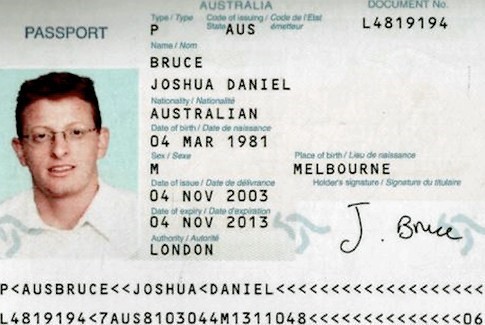
The passports affair came just before an operation from the Israeli military where they boarded one of the six ships of the Gaza Freedom Flotilla, launched by a coalition of pro-Palestinian human rights groups to break the Israeli-Egyptian blockade of the Gaza Strip. Nine people were killed when Israeli soldiers landed on the ship from helicopters. All six ships were escorted to an Israeli port and everyone on board was detained for several days before being expelled from Israel. The incident sparked international outrage, and then Prime Minister Rudd condemned “any use of violence under the circumstances that we have seen.” He called for the blockade of Gaza to be lifted, and for the setting up of an independent inquiry into the incident.
Leibler was apoplectic over Rudd’s comments and his expulsion of the Israeli diplomat. Nevertheless, Gawenda notes how the passports incident was “especially difficult, time-consuming and troubling for him, because it was specifically about the relationship between Australia and Israel, and because it was hard to defend what the Israelis had done.”[16] He wanted to settle the passports issue and for things to “move on.” In this endeavor, Leibler worked closely with the Israeli Ambassador in Canberra, Yuval Rotem, to repair the diplomatic relationship. He reached out to cabinet ministers and senior public servants, including the head of ASIO, “who invariably took his calls or agreed to see him,” while Rotem “lobbied members of the Rudd and Gillard governments.”[17]
Reflecting back on the passports incident in the second volume of his memoirs, The PM Years, published in 2018, Rudd observes that the Israel Lobby tried to “menace him” for his strong response to the passports affair. Rudd describes a meeting of the National Security Committee of Cabinet after the second passports incident. Dennis Richardson, head of ASIO at the time of the first incident and now head of the Department of Foreign Affairs, had urged them to “act firmly and decisively.” All agreed with this recommendation, except for Julia Gillard regarding whom Rudd “knew for a fact that Julia had been cultivating the Israeli Lobby in Australia.”[18] Leibler had first met Gillard after she visited Israel on a Rambam Fellowship in 2001, and had cultivated a close relationship with her.
In June of 2010, Jewish Labor MP Mark Dreyfus (later Gillard’s Attorney-General) called Leibler, whom he had known for many years, to organize, at Rudd’s request, a dinner with Leibler and other Jewish community leaders to discuss the passports issues and the Gaza flotilla. Rudd was keen to repair his strained relationship with organized Jewry. Rudd writes in his memoir that he agreed to put on the dinner out of respect for Labor’s Jewish MP’s Michael Danby and Mark Dreyfus, who had lobbied him to put on the dinner for the Jewish leaders. According to Rudd, he sat politely at the table while Leibler berated him for committing the “hostile act” of expelling the Israeli diplomat. When Rudd offered Leibler a briefing with Richardson, Leibler turned angry and made a “menacing threat.” Rudd records Leibler as saying, “Julia is looking very good in the public eye these days, Prime Minister. She’s performing very strongly. She’s a great friend of Israel. But you shouldn’t be anxious about her, should you, Prime Minister.”[19]
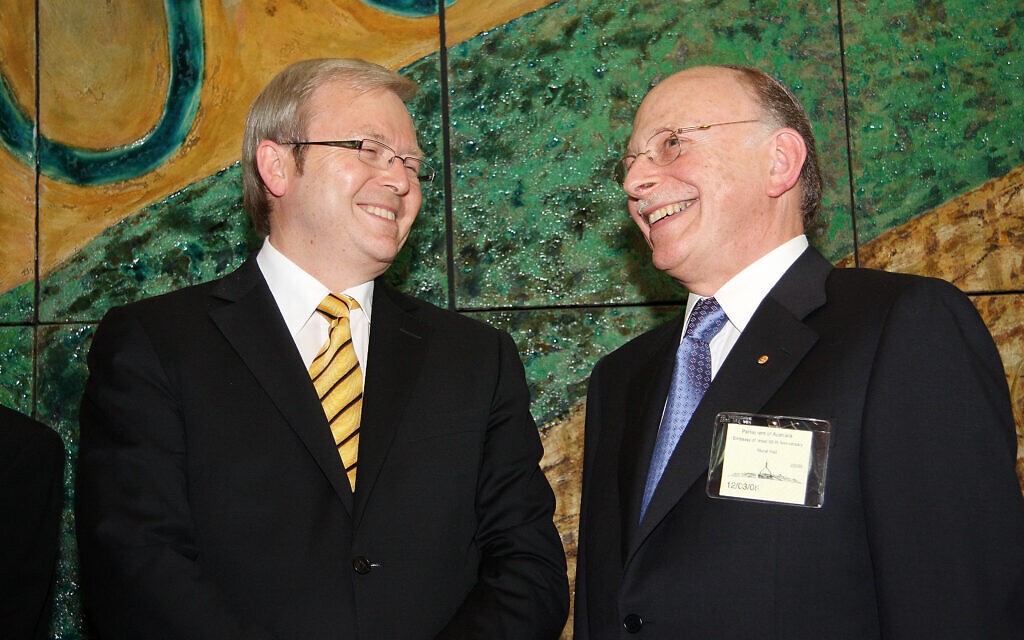
In his contemporaneous notes of the meeting, Leibler acknowledges he was blunt with Rudd, telling him the Jewish community was “pissed off” by the expulsion of the Israeli diplomat, which he characterized as an “overreaction.” In his notes, Leibler only mentions Gillard once, praising her for comments she made saying Israel was justified in responding militarily to missile attacks by Hamas in 2009. According to Leibler’s notes: “Rudd responded by saying that he discussed and approved the statement by Julia Gillard. I said, ‘Don’t be so sensitive — this is something we assumed.’ For about 30 seconds there was dead silence and I thought Rudd’s eyes were going to pop out of his head, and then we reverted back to normal conversation.”[20]
Three weeks after Leibler’s threat to Rudd, Julia Gillard defeated Rudd in a leadership ballot and became Australia’s first female prime minister. Leibler and the Israel Lobby supported Gillard’s challenge to him, and were, to a significant extent, responsible for his defeat—reportedly plotting Rudd’s removal for at least a year prior to Gillard’s successful challenge. In his book, Rudd notes that “the meticulous work of moving Gillard from left to right on [Middle Eastern] foreign policy had already begun in earnest a year before the coup.”[21] Gawenda claims to be bemused at Rudd’s belief that “Jews were so powerful they could play a role in deciding the fate of an Australian prime minister.” For Gawenda, “the idea that a Jewish leader, even a tough one like Leibler, could intimidate or seriously threaten politicians like Rudd or Carr seems far-fetched.”
Julia Gillard — A Wholly-Owned Subsidiary of the Israel Lobby
The validity of Rudd’s view was confirmed by the close relationship Leibler forged with Gillard during her tenure as Prime Minister. In The PM Years, Rudd describes how Gillard became a “wholly-owned subsidiary of the far-right Australian Israel Lobby.”[22] Gawenda is troubled by Rudd’s language regarding the actions of Australia’s Israel Lobby, seeing it as “verging on a conspiratorial darkness.” Echoing this view, Leibler responded with fury to Rudd’s version of events, labelling his accusations as “far-fetched conspiracy theories.”[23] Other Jewish leaders (inevitably) came to Leibler’s aid and disputed Rudd’s version of events at the Canberra dinner. In 2018, Michael Danby and Australian Jewish businessman Albert Dadon said the incidents Rudd described “had not happened, at least not in our presence.”[24]
Dadon’s comments are significant for Gawenda because of Dadon’s former role as Rudd’s Court Jew, and as someone Rudd found “far more congenial than some other Jewish community leaders, especially those at AIJAC, including Leibler.”[25] Journalist Jason Koutsoukis observed in 2009, regarding Dadon, that: “In the small but competitive world of Australian Jewish politics, the ultimate test of esteem is whether or not you have the ear of the Prime Minister of the day.” Dadon took on the role of that AIJAC bigwig Colin Rubinstein had assumed during John Howard’s tenure as Prime Minister. He spotted Rudd’s potential soon after he entered parliament in 1998 and “courted the future Prime Minister assiduously.”[26] It was under Dadon’s direction that Rudd inaugurated the annual Australia-Israel Leadership Forum in Jerusalem — a two-day talkfest for Australian and Israeli politicians, academics and businesspeople designed to further consolidate the Australia-Israel alliance.
Gillard claimed her close relationship “to some people in the Jewish community, including Dadon and Leibler, was never an issue between her and Rudd before the leadership challenge.”[27] Those who, like Rudd, believed Gillard had been captured by Jewish interests noted, in support of this contention, that her partner, Tim Mathieson, had been employed since 2009 as a property sales consultant by Ubertas Group, a fund management and property development company owned by Albert Dadon. Mathieson was given the position after he and Gillard attended the first Australia-Israel Leadership Forum in Jerusalem — an initiative of Albert Dadon.
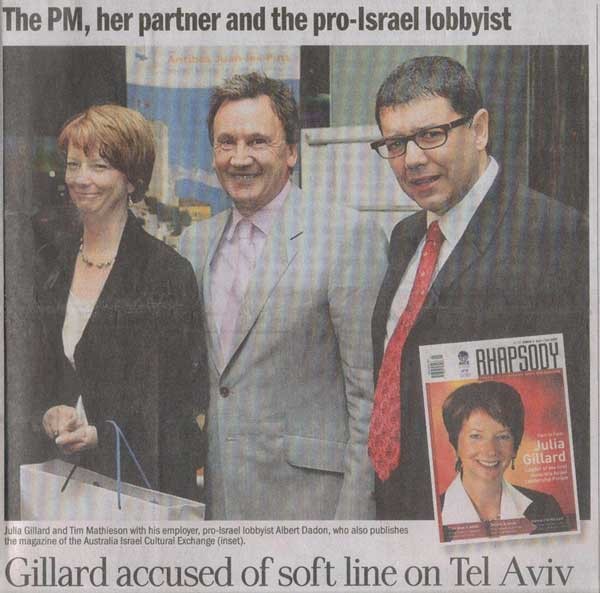
It was in this context that Gillard flatly refused to criticize Israel for its Operation Cast Lead in 2009. Gillard’s Jewish alliances even extended beyond Australian Jewish leaders and businessmen. In The PM Years, Rudd points out that Gillard’s “ever-loyal American factotum, Bruce Wolpe, her lifeline to the Australian and American Jewish communities,” exercised a Svengali-like influence on her, even before she had taken over from Rudd as Prime Minister.[28] Wolpe, a Jewish-American political operative married to an Australian, had settled in Australia and played an important role in moving Gillard to a position of uncritical support for the Israel Lobby’s views.
Wolpe had been senior advisor to Democratic congressman Henry Waxman, with “seriously impressive contacts in the United States Congress and in the Democratic Party.” He was appointed as Gillard’s senior advisor (i.e., Court Jew) in 2010, soon after she became Prime Minister. His role was twofold: “to develop contacts and interaction with the Australian business community, and to be the contact person between the Prime Minister and the Jewish community.”[29] Gillard justified giving Wolpe the liaison role with the Jewish community on the basis that “there was increasing dissatisfaction with that community about the way Rudd was behaving.”[30]
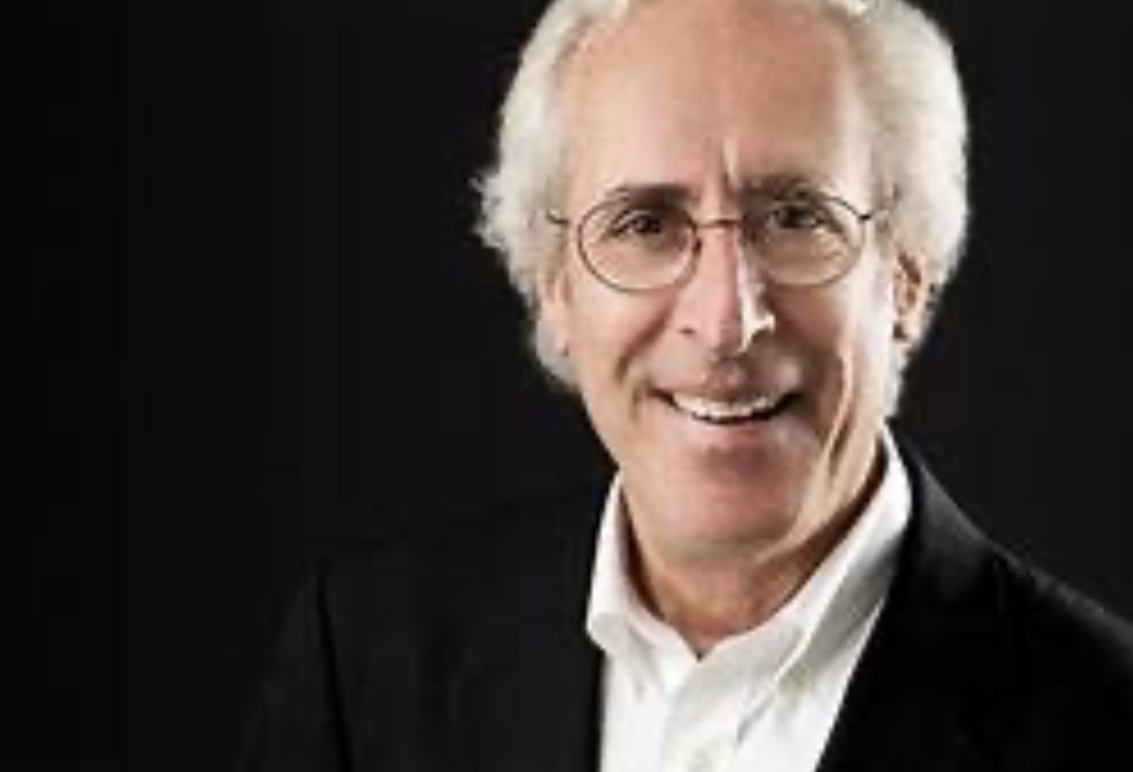
Three months after she became Prime Minister, Gillard reluctantly appointed the defeated Rudd as her Foreign Minister due to his previous experience in the role. Several times, she vetoed press releases from Rudd on Israel and Palestine that she claimed did not reflect her government’s position. By this time, Leibler “had come to seriously distrust Rudd,” finding him “frustrating to deal with.” In his contemporaneous notes, Leibler claims Rudd was “courting the Arab bloc” at the UN by signaling that Australia might vote for a resolution in the General Assembly declaring Palestine a state, though with non-voting status. Gillard had privately rebuffed Rudd and instructed Australia’s Ambassador to the United Nations to vote against any resolution on statehood for Palestine.
In February 2012, Kevin Rudd resigned as Foreign Minister to challenge Gillard for the Labor leadership, and therefore for prime minister. His first challenge failed, and with Rudd now out of the Gillard Cabinet, former New South Wales Premier Bob Carr was enlisted by Gillard to fill the vacant position of Foreign Minister. In making this appointment, Gillard was unaware that Carr’s position on Israel and the Palestinians had changed over the years. Leibler, on the other hand, was aware of Carr’s shift in perspective, and was apprehensive about the appointment. Despite this, he was reassured by the fact “his relationship with Gillard was strong” and that “she would have the final say on her government’s policy on Israel and the Palestinians.”[31]
Originally published at The Occidental Observer on December 7, 2020.
Brenton Sanderson is the author of Battle Lines: Essays on Western Culture, Jewish Influence and Anti-Semitism, available here and here.
[1] Michael Gawenda, The Powerbroker: Mark Leibler, An Australian Jewish Life (Melbourne: Monash University Publishing, 2020), 249.
[2] Ibid., 253.
[3] Ibid., 254.
[4] Ibid., 251.
[5] Ibid., 254.
[6] Ibid., 254-55.
[7] Ibid., 255.
[8] Ibid., 256.
[9] Ibid., 258.
[10] Ibid., 312.
[11] Ibid., 323.
[12] Ibid., 250.
[13] Greg Barns, “Israel’s ‘useful idiots’ in the Australian media,” Crikey, May 27, 2009. https://www.crikey.com.au/2009/05/27/israels-useful-idiots-in-the-australian-media/
[14] Gawenda, The Powerbroker, 251.
[15] Ibid., 248.
[16] Ibid., 262.
[17] Ibid., 262; 263.
[18] Kevin Rudd, The PM Years (Sydney: MacMillian Australia, 2018), 400.
[19] Ibid., 266.
[20] Ibid., 267.
[21] Rudd, The PM Years, 430.
[22] Ibid., 431.
[23] Gawenda, The Powerbroker, 271.
[24] Ibid., 270.
[25] Ibid., 270.
[26] Jason Koutsoukis, “New figure steals into the limelight of Jewish affairs,” The Sydney Morning Herald, June 25, 2009. https://www.smh.com.au/national/new-figure-steals-into-the-limelight-of-jewish-affairs-20090624-cwyp.html
[27] Gawenda, The Powerbroker, 271.
[28] Rudd, The PM Years, 442.
[29] Ibid., 273.
[30] Ibid., 274.
[31] Ibid., 276.

